Duque should take leave from post amid investigation — senator
HEALTH SECRETARY Francisco T. Duque should take a leave of absence while the Ombudsman is conducting an investigation on alleged irregularities in the Department of Health’s response to the coronavirus disease 2019 (COVID-19), a senator said on Thursday. “To make the investigation impartial, I think the best, the most appropriate thing to do is to take a leave of absence,” Senator Sherwin T. Gatchalian said in an online briefing. Ombudsman Samuel R. Martires on Wednesday announced the formation of two teams to investigate health officials due to delays in the procurement of medical supplies as well as in granting compensation for health workers who contracted or died from the disease.Senators, who have long flagged the alleged incompetence of Mr. Duque, filed a resolution in April asking him to resign for lack of foresight and poor planning in addressing the heath emergency. Despite this, Mr. Duque continued to have the confidence of President Rodrigo R. Duterte and has kept his post. “It does not matter to him what we say. He will just tell you he serves at the pleasure of the President,” Senate President Vicente C. Sotto III said in a phone message Thursday.“We tried. Falls into deaf ears. Let it be!” said Mr. Sotto, who led the 15 senators who filed the resolution. –Charmaine A. Tadalan
PhilHealth officials warned against suspending UHC implementation
THE PRESIDENTIAL Palace on Thursday warned Philippine Health Insurance Corp. (PhilHealth) officials against suspending the implementation of the Universal Health Care (UHC) Law, citing that they could be replaced for failure to deliver their mandate. “My appeal to those who lead PhilHealth, if you cannot implement a law that was certified urgent by the President… maybe we should just find others who will be able to accomplish that,” Palace Spokesperson Harry L. Roque, speaking in Filipino, said in a briefing on Thursday. PhilHealth President Ricardo C. Morales on Wednesday calledfor a delay in the UHC implementation amid the health emergency brought about by the coronavirus. The UHC rollout started in January this year, withnationwide and full implementation seen to take up to 10 years. Mr. Roque, a former congressman who was one of the authors of the UHC Law, said the government will spend billions of its own funds if necessary todeliver the improved health system.
PAYMENTS
Meanwhile, PhilHealth has denied that about 300 private hospitals are facing closure due to delayed payments.“The resolution submitted in the lower chamber contains issues that have been adequately responded to previously. PhilHealth reiterates its earlier statement denying the claim of PHAPI (Private Hospitals Association Philippines, Inc.) that 300 or so hospitals are facing closure due to delayed payments,” the agency said in a statement on Thursday.The state-owned insurance company was responding to House Resolution 970, which calls on PhilHealth to settle at least P18 billion in alleged unpaid reimbursement claims of accredited hospitals nationwide.In his resolution, Cagayan de Oro City Rep. Rufus B. Rodriguez quoted claims by the PHAPI that PhilHealth owed its members P14 billion as of December 2018 and P4 billion at the end of 2019.He also cited University of Santo Tomas Hospital (USTH) Medical Director Marcellus Francis L. Ramirez, who said that the delay in PhilHealth payments is “an average of 5-6 months” and that the hospital’s receivables stood “at more than P180 million and counting.”PhilHealth asserts that it has paid a total of P114.6 billion to its accredited hospitals in 2018, and P97.4 billion in 2019. For this year, the agency said it has so far disbursed more than P43 billion, of which P24.5 billion or 56.8% were paid to private hospitals. In the case of USTH, PhilHealth said it has paid the hospital “around P400 million in 2019 up until May 2020, and recently advanced Php 85 million as part of the Corporation’s COVID-19 (coronavirus disease 2019) response.” Citing a May 5, 2020 letter, “the USTH said that it is reconciling their claims records with PhilHealth’s,” it added.“The economic losses brought about by the pandemic have taken its toll in the overall business climate in the country, which also affect hospitals that reel from the sharp decrease in patient admissions due to COVIDscare. However, this should not be attributed solely to alleged unpaid claims to a point of exhuming an old issue that is now being seriously addressed by the Agency,” Philhealth said. – Gillian M. Cortez and Genshen L. Espedido
Supreme Court voids BIR tax on condominium membership dues
THE SUPREME Court has declared invalid aBureau of Internal Revenue (BIR) memorandum imposing a 32% income tax and 12% value-added tax on association dues or membership fees paid by condominium tenants to building operators.In a 33-page ruling dated January 15 and released June 16, the high court’s first division affirmed the decision of a Makati trial court declaring revenue memorandum circular circular 65-2012 invalid for creating additional burden on condominium operators.The court cited Republic Act 4726, the law governing condominiums, which allows operators to collect association dues, membership fees, and other assessment charges for maintenance insurance policies, and other maintenance services. Such activities are not considered for income or profit. “To repeat, they are collected purely for the benefit of the condominium owners and are the incidental consequence of a condominium corporation’s responsibility to effectively oversee, maintain, or even improve the common areas of the condominium as well as its governance,” the court said.The petition was filed by First E-Bank Tower Condominium Corp.The decision was penned by Associate Justice Amy C. Lazaro-Javier, and concurred by Chief Justice Diosdado M. Peralta and concurred by Associate Justices Alfredo Benjamin S. Caguioa, Jose C. Reyes, Jr. and Mario V. Lopez. – Vann Marlo M. Villegas
Students should not be required to buy gadgets for online classes
STUDENTS should not be required to buy gadgets to access online classes when the new school year opens in August, Senator Sherwin T. Gatchalian said on Thursday. “Wag natin pilitin ang students na bumili ng gadgets, bumili ng load, bumili ng(Let us not force students to buy gadget, buy internet load, buy) laptop, tablet,” Mr. Gatchalian, who chairs the committee on basic education, arts and culture, said in an online briefing. “We should not force our students to go online,” he added. He pointed out that distance learning should not only offer online classes, but also learning modules that may be delivered to the student’s house. He also noted that lessons through government television and radio can reach more learners. “Naninwiala ako na TV and radio pa rin ang piankamalawak sa ating bansa at ‘yun din ang pinaka-affordable (I believe that TV and radio are still the most widely accessible media nationwide and most affordable). By July 15, DepEd (Department of Education) will finalize its TV-radio modules,” he said.President Rodrigo R. Duterte on Monday said he is looking at purchasing radios for learners in far-flung areas, in line with his directive to postpone the conduct of face-to-face classes in the absence of a vaccine against the coronavirus disease 2019. Senator Ralph G. Recto, meanwhile, proposed to return the funding that was cut from for DepEd’s budget to aid in the country’s response to the pandemic. “If we can print money, why can’t we print books? The ones public school students are using cost as little as P50. Kung may perang pang transistor radios, dapat mayroon ding pang libro(If there is money for transistor radios, there should also be funds for books),” Mr. Recto said in a statement. – Charmaine A. Tadalan
US grants $2.5 million aid for DepEd COVID response
THE UNITED States government is providing $2.5 million, equivalent to about P126 million, in support of the Philippines’ Basic Education-Learning Continuity Plan during the coronavirus disease 2019 pandemic. “The U.S. government, through USAID (US Agency for International Development), remains committed to ensuring young students have the opportunity to continue to learn despite the challenges that COVID-19 has created,” USAID Mission Director Lawrence Hardy said in a statement Thursday. The continuity plan is the Department of Education’s (DepEd) response to the disruption in basic education due to the crisis, which will largely depend on distance learning. More than 27.7 million students are seen to be affected by school suspension and other challenges such as lack of access to learning materials.The US assistance will provide teachers instruction strategies and learning materials useful for both school and home learning. It will also support parents for more effective home learning activities. Further, USAID has assisted DepEd in developing assessment tools to gauge student literacy skills. It will also be partnering with the private sector and local media companies for information sharing to help learners while classes are suspended. – Charmaine A. Tadalan
Bill setting1 year prescription period for cyber libel filed in House
A BILLseeking to amend the Anti-Cyber Crime Law with the introduction of a one-year prescription period for cyber libel has been filed in the House of Representatives. Cagayan de Oro City Rep. Rufus B. Rodriguez filed House Bill 7010 after a Manila court convicted Rappler, Inc. Chief Executive Officer Maria Ressa and former writer-researcher Reynaldo Santos Jr. of cyber libel over an article published in 2012.They were sentenced to six months to six years in prison and ordered to jointly pay the businessman who sued them P400,000 in moral and exemplary damages.The proposed measure introduces a new section stating that there is only a one-year prescription period for libel under the Cybercrime Law, which is currently silent on the matter.“Some legal experts argue that since the article involved in the Ressa-Santos case was published in May 2012, then the alleged crime has prescribed in May 2013. If it was republished in February 2014, then the complainant had only until February 2015 to file a complaint. The case was filed in court on Feb. 5, 2019,” Mr. Rodrigues said in a statement on Thursday.He cited Far Eastern University Law Dean Melencio S. Sta. Maria who said the Supreme Court, in upholding the constitutionality of the Anti-Cyber Crime Law, already ruled that cyber libel “is not a new crime” since the Revised Penal Code already punishes libel,which has a prescription period of only one year.“Because cyber libel is not a new crime, then the one-year prescriptive period applies to it. Moreover, such prescriptive period (under the Penal Code) was not changed by the Anti-Cyber Libel Law,” Mr. Rodriguez said. – Genshen L. Espedido



